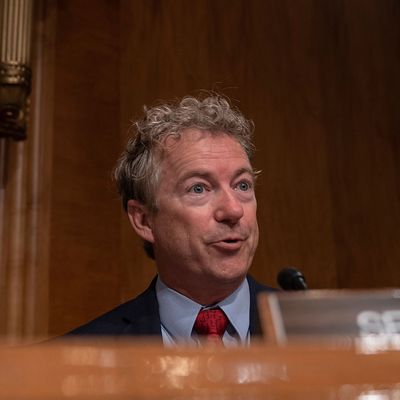
Last week, the House passed an extension of the September 11th Victim Compensation Fund that would provide funding for the care of first responders and their families until fiscal year 2090. The vote was near unanimous, at 402-12, and, according to a statement last Friday from Mitch McConnell, it appeared the Senate would approve it without controversy: “The Senate has never forgotten the Victim Compensation Fund, and we aren’t about to start now.”
But McConnell forgot about small-government maven Rand Paul, who blocked Democrats’ attempts to pass the bill. “It has long been my feeling that we need to address our massive debt in the country,” Paul said. “And therefore any new spending … should be offset by cutting spending that’s less valuable. We need to at the very least have this debate.”
One of the few deficit hawks remaining in the party — Mick Mulvaney has certainly bailed on him — Paul seems to be attracting unnecessary criticism for his effort, considering that the bill will still be brought to the floor for a vote following his objection. “Senator Paul may have turned his back on our first responders today, but now we have a filibuster-proof bipartisan support of 73 cosponsors in addition to myself,” Kirsten Gillibrand, who introduced the bill, said on Wednesday.
Over the years, advocates for extending funding for first responders and victims of 9/11 have repeatedly faced off with Republicans objecting to the effort in the name of fiscal responsibility. In 2010, 42 Republicans motioned to block the vote on the passage of the Zadroga Act, named after the first NYPD officer whose death could be attributed to exposure to toxic chemicals at Ground Zero. In 2015, the bill was held up again by two House Republican committee chairmen concerned about spending.
In 2010, 2015, and 2019, former Daily Show host Jon Stewart helped drum up, or shame, lawmakers into finding the political will to pass protections for victims and first responders. “I don’t even know if there was a deal [to pass the act], to be honest with you, before his show,” Kenny Specht, a firefighter interviewed on an episode of the Daily Show devoted exclusively to the Zadroga Act, told the New York Times.
Last month, Stewart helped bring momentum to the effort to secure permanent funding for the 9/11 Victim Compensation Fund. “I can’t help but think what an incredible metaphor this room is for the entire process that getting health care and benefits for 9/11 first responders has come to,” Stewart said before an under-attended House subcommittee on June 11. “Behind me, a filled room of 9/11 first responders. And in front of me, a nearly empty Congress. Sick and dying, they brought themselves down here to speak to no one.”
On Wednesday, Stewart called Paul’s effort “an abomination” on Fox News, adding: “Pardon me if I’m not impressed in any way by Rand Paul’s fiscal responsibility virtue signaling.”
Luis Alvarez, a first responder who appeared with Stewart before the House, added, “I will not stand by and watch as my friends with cancer from 9/11 like me are valued less than anyone else because of when they get sick. You made me come here the day before my 69th round of chemo. I’m going to make sure that you never forget to take care of the 9/11 responders.” Less than three weeks later, he died in hospice at the age of 53.
This post has been updated to include Jon Stewart’s response.






























